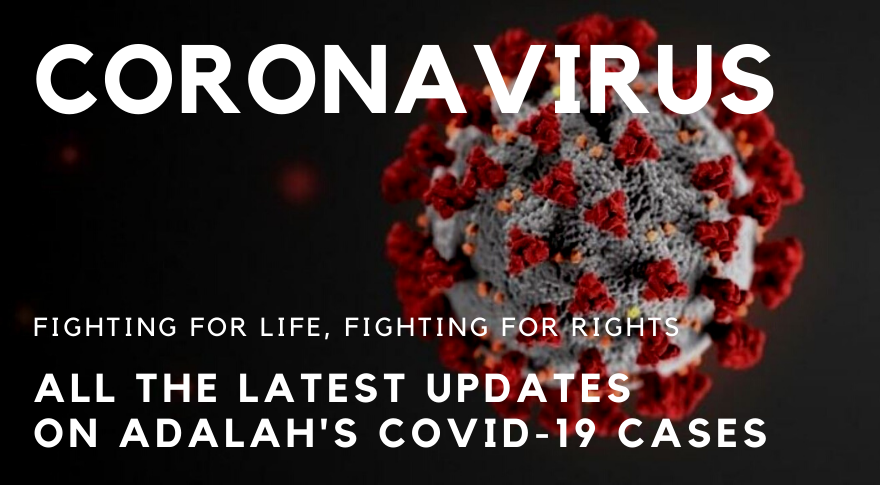Israeli Supreme Court rules: Palestinian prisoners have no right to social distancing protection against COVID-19
The Israeli Supreme Court ruled late on Thursday, 23 July 2020, that Palestinians being held in Israeli prisons have no right to social distancing protection against the COVID-19 virus.
The court had convened earlier in the day to hear a petition filed by Adalah – The Legal Center for Arab Minority Rights in Israel demanding that the Israel Prison Service (IPS) and Israel’s Public Security Ministry take all necessary actions to protect from a COVID-19 outbreak the 450 prisoners – overwhelmingly Palestinians – who are classified as “security prisoners” in the overcrowded Gilboa prison.
Adalah Attorney Myssana Morany, who submitted the petition on behalf of the families of two Palestinian prisoners, responded to the ruling by the top Israeli court:
Gilboa prison (Google Maps)
The Supreme Court justices accepted the claim promoted by Israeli state authorities that Palestinians held in prison are no different than family members or flatmates living in the same home, completely ignoring the fact that prisoners are held under duress and Israeli authorities are responsible for their health and the conditions of their incarceration.
The court ruling has freed the IPS from the obligation to maintain, and or even strive for, safe social distancing in the cells of Palestinian “security prisoners”. This runs contrary to basic COVID-19 health practices employed by prison authorities around the world.
Last night’s ruling also illustrates the Israeli Supreme Court's continued avoidance throughout the period of the COVID-19 pandemic to hear petitions related to ensuring the protection of prisoners’ rights.
The Supreme Court further ruled that Adalah is liable for covering NIS 5,000 in court expenses.
In the petition, Adalah demanded that the Israel Prison Service (IPS) and Israel’s Public Security Ministry implement Israeli Health Ministry social distancing guidelines for the prisoners held in this facility, located in the north of the country.
Materials given by state authorities to the Supreme Court and discussed in yesterday’s hearing stressed that social distancing restrictions should not apply to family members or individuals who live together, but nevertheless, they also recognized the need to reduce the population density inside Israeli facilities amongst prisoners serving time for criminal sentences.
Adalah Attorney Myssana Morany commented immediately following the hearing:
WHAT YOU NEED TO KNOW ABOUT ISRAELI PRISONS
Six prisoners are housed in cells 22 square meters in size (including a shared toilet and bathroom) that contain three bunkbeds in Gilboa Prison. Under these conditions, prisoners are unable to adhere to Israeli Health Ministry’s social distancing guidelines for preventing the spread of COVID-19, thus endangering their safety and lives.
Israeli state representatives provided the court with updated figures on the extent of the COVID-19 pandemic inside IPS detention facilities:
- 30 IPS employees are infected with COVID-19
- 7 prisoners (including 2 security prisoners) are infected with COVID-19
- 489 IPS employees are in quarantine
- 58 prisoners (including 10 security prisoners) are in quarantine
- The IPS has conducted 9,124 COVID-19 tests, some 4,000 of which were for prisoners
Adalah made repeated attempts to obtain information from the IPS about the conditions under which the Palestinian prisoners are detained, especially in view of their exclusion from new measures intended to reduce prison density. While Israel has recently released hundreds of prisoners during the COVID-19 crisis due to overcrowding, no Palestinians classified as security prisoners have been released.
In response to a pre-COVID-19 petition filed by the Association for Civil Rights in Israel, the Israeli Supreme Court ruled that Israeli prison facilities must guarantee a minimum living space of 4.5 square meters per prisoner. The IPS has not abided by this Supreme Court ruling.
Case Citation: HCJ 2904/20, Adalah et. al. v. Israel Prison Service, et. al.
CLICK HERE to read the Israeli Supreme Court rulinע [Hebrew]
CLICK HERE to read the petition [Hebrew]
(Photo: Google Maps)















